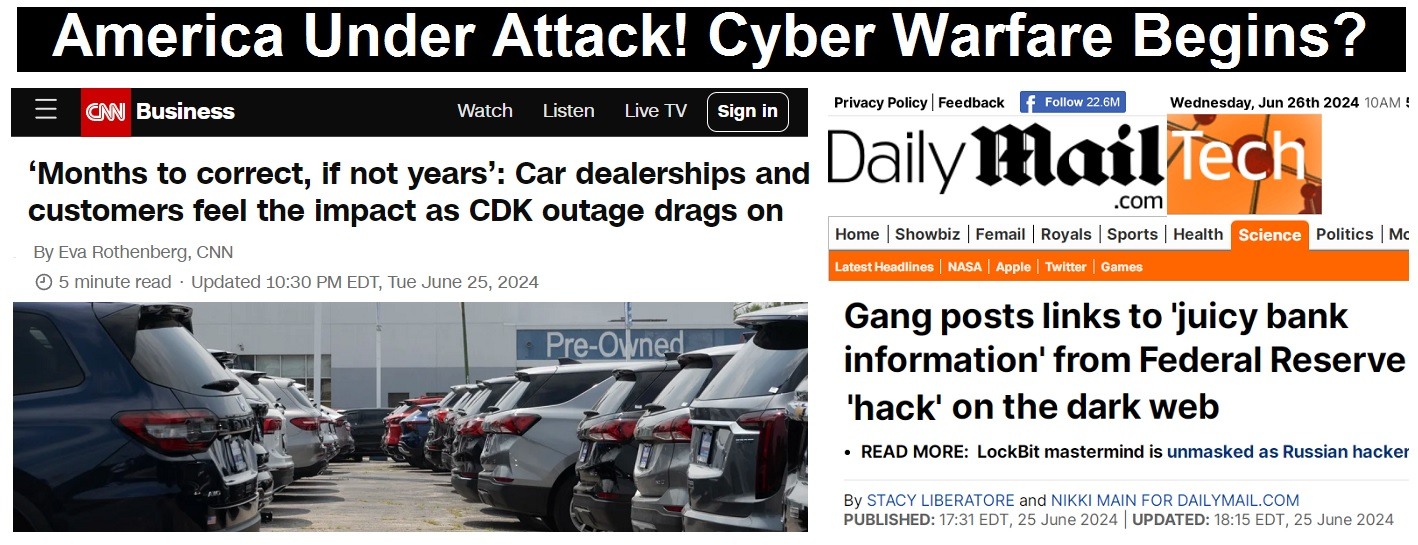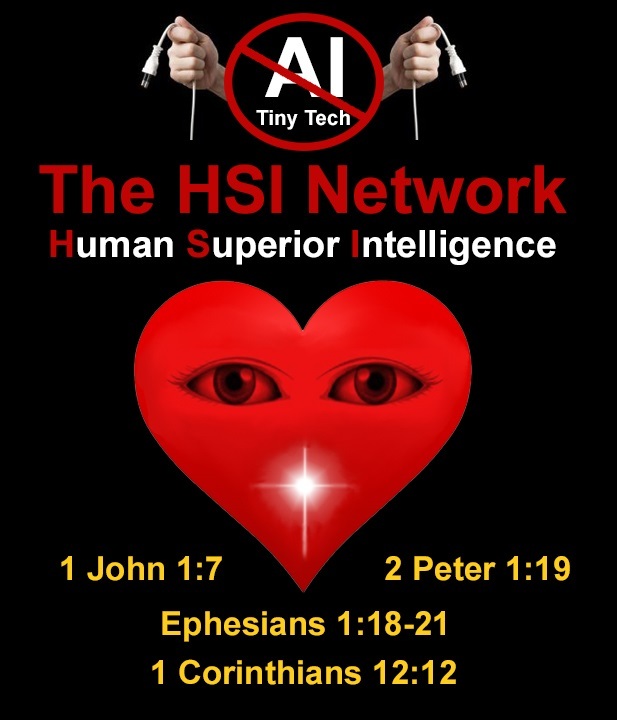
by Brian Shilhavy
Editor, Health Impact New
While the U.S. media is currently focusing on politics with the upcoming presidential debate, as well as a slew of Supreme Court decisions that are being handed down today, there are other stories not making headlines that may indicate the U.S. economy might be on the brink of collapse.
In fact, the U.S. may be in the beginning stages of a “cyber pandemic” that the Globalists at the World Economic Forum have been predicting for the past few years, which they have said will be far more serious than the “COVID Pandemic” was.
For our previous coverage on the predicted “cyber pandemic” see:
WEF Warns Of Cyber Attack Leading To Systemic Collapse Of The Global Financial System
First, the auto industry has been in total disarray since last week when a cyber attack took down the main software system that is used by 15,000 dealerships nationwide to sell cars.
The software network is called CDK Global, and their CEO announced today that they do not plan to have their software system back up and running by the end of the month, which is striking terror into the hearts of car sales people all across the country, as the last few days of the month are typically their busiest selling days as they seek to increase their paychecks for the month with sales commissions.
This one single event alone could take down the U.S. economy.
One car dealer sales manager told CNN yesterday that “The financial impact it will directly have on us will take months to correct, if not years.”
A CDK Global system outage has affected nearly every aspect of the Mazda dealership in Seekonk, Massachusetts, where Ryan Callahan is general sales manager. He says it won’t be a simple fix.
“The financial impact it will directly have on us will take months to correct, if not years,” Callahan said.
Car buyers and dealers are grappling with the shutdown of the retail software provider, which has left nearly 15,000 car dealerships across North America struggling to provide services to customers and scrambling to find temporary analog solutions to operate. (Source.)
The CDK Global system has been used by car dealers to handle every aspect of the transaction of a vehicle, which includes automatically registering the car with the State’s government vehicle registry system, which is necessary for car owners to be able to drive their vehicles.
So dealers are now telling their customers to go directly to their local motor vehicle registry government office, which is overburdening DMV offices across the nation who are not staffed to handle such an influx of car owners.
Midway Automotive uses a CDK product to register cars with the Massachusetts Registry of Motor Vehicles.
Owner Michael Deveney says that after the shutdown on Wednesday, the dealership started sending customers to their local RMV office in order to register their cars in person after purchase.
“That was up until Thursday. Then customers started being told that (the RMV) wasn’t taking any walk-ins,” he said. “They were probably getting flooded with customers and started turning people away.”
Deveney said one customer got increasingly agitated because he couldn’t register his car. “Getting an appointment might take three or four days, and in that time they aren’t really able to drive their cars,” he added.
Some 30 miles north in Lynn, Katelyn Salvato says she hasn’t been able to register a vehicle since last Tuesday. Salvato works as a title clerk for Pride Motor Group, registering cars for three dealerships.
“Today… I sent 21 registrations to be done manually at the Massachusetts RMV,” she said, adding that the RMV won’t accept transactions from dealership employees. “The transactions must be dropped off within the designated hours (of 10 am to 3 pm), and the runner can’t wait for them.”
Callahan echoed those concerns. Under normal circumstances, the CDK software allows the dealership to register a vehicle almost instantaneously, but now the process faces heavy delays.
“Our remote registration system is rendered useless without CDK to talk to it. We’ve had to send a runner with the registrations to the DMV to be competed in packs, costing several days where prior it took hours,” Callahan said in an interview with CNN.
If a vehicle isn’t registered within seven days of purchase, the state penalizes both the dealership and customers.
The Massachusetts Department of Transportation, which oversees the state’s RMV, has not responded to CNN’s request for comment. (Source.)
Here is a good 5-minute video from Bloomberg Television which explains the severity of this situation, which goes beyond the dealerships, and could also affect consumers who drive newer cars that are connected to the Internet. (I wouldn’t want to be driving a Tesla right now!!)
I found the comment that this is sending dealership employees “back to the stone age by having to use pen and paper” quite interesting, because how many younger adults in the workforce today even know how to use a pen and paper and do cursive writing??
The other big cyber attack story that is not yet headlines in the U.S. media, is a report that the Federal Reserve has been hacked by the infamous LockBit ransomware gang, threatening to reveal sensitive banking information about U.S. banks.
The group claims that they have obtained 33 terabytes of data from the U.S. Central Bank, and they gave U.S. officials a deadline of Tuesday night (last night at the time of this writing) to pay them off. They also claimed that the Federal Reserve had only paid them $50,000.00, which was not nearly enough.
At the time of this writing, they are reported to have made good on their threat so far by publishing some links, but so far nobody has been able to verify if they actually do have this data.
In spite of reportedly paying the group $50K so far, the Federal Reserve has yet to comment on this. LockBit is reported to have been behind 48% of the cyber attacks in 2023.
LockBit holds its word, publishes US Federal Reserve alleged data
On Tuesday, the LockBit ransomware gang published a massive cache of files allegedly stolen from the US Federal Reserve central banking system after an apparent negotiation breakdown.
The Russian-affiliated gang posted 21 separate links, containing files of what appears to be parent directories, torrents, and compressed archive files belonging to another US financial institution, Evolve Bank and Trust.
The bank and its parent company, Evolve Bancorp Inc., were singled out recently by the Feds for engaging in unsafe and unsound banking practices.
LockBit had named the Federal Reserve on its dark victim blog over the weekend, threatening to publish the purported stolen data on June 25th if a ransom demand was not paid by the deadline.
Claiming to have lifted “33 terabytes of juicy banking information containing Americans’ banking secrets,” the group also insinuated that negotiations had broken down over an unacceptable ransom offer by the US central bank.
“You better hire another negotiator within 48 hours, and fire this clinical idiot who values Americans’ bank secrecy at $50,000,” LockBit posted on its dark blog.
Cybernews reached out to the US Federal Reserve Board of Governors on Monday about LockBit’s claims, but the spokesperson did not comment. We reached out to the spokesperson again on Tuesday.
Meantime, Evolve Bank and Trust had been served a cease-and-desist order by the Federal Reserve Board this month, citing multiple “deficiencies” in the bank’s anti-money laundering, risk management, and consumer compliance programs.
Headquartered in Memphis, Tennessee, the independent consumer Banking-as-a-Service and mortgage lender serves individuals and small businesses in at least 17 states across the nation, listing assets of $1.3 billion in 2022, according to its website.
Evolve is also known for its open banking partnerships with Fintech platforms such as Mastercard, Visa, Affirm, Melio, Stripe, and Airwallex.
LockBit was kind enough to attach a Federal Reserve June 14th press release about the Evolve enforcement action as part of the ‘stolen’ collection.
Josh Jacobson, Director of Professional Services at HackerOne says the threats made by LockBit speak to the fact that “even our most integral governmental entities are not infallible to ransomware attacks.”
“If the Federal Reserve is impacted, that could have global implications. This is not a siloed infrastructure where a finite number of customers are impacted. The potential for residual impact definitely factors in, as well as long-term reputation and trust,” he said.
The Cybernews team, which has not had time to verify the stolen data, will continue to provide updates on this developing story. (Source.)
There are also multiple stories being reported about cyber attacks outside the U.S. today, especially in Indonesia:
More Than 40 Indonesian Agencies Hit by Cyberattack on Data Centres
JAKARTA (Reuters) – More than 40 Indonesian agencies, including the ministry overseeing immigration, were impacted by a cyberattack on the country’s data centres, an official said on Wednesday.
The latest cyberattack, the worst that the country has experienced in recent years, disrupted immigration services and affected operations at Indonesia’s major airports for days. (Full article.)
In other news published today, Pam Martens of Wall Street on Parade reported that the Federal Reserve has now posted historical losses of $176 billion since September of 2022.
The Fed Posts Historic Operating Losses As It Pays Out 5.40 Percent Interest to Banks
According to Federal Reserve data, for the first time in its history, the Fed has been losing money on a consistent monthly basis since September 28, 2022. As of the last reporting date of June 19, 2024, those losses add up to a cumulative $176 billion. As the chart above using Fed data shows, the losses thus far in 2024 have ranged from a monthly high of $11.076 billion in February to a low of $5.674 billion in May.
These losses are separate and distinct from the unrealized losses the Fed is experiencing on the debt securities it holds on its balance sheet. It does not mark those losses to market since it intends to hold the securities to maturity and their principal is guaranteed at maturity by the U.S. government.
The losses shown in the above chart are actual cash operating losses that result from the fact that the Fed is earning significantly less interest on its debt securities than the high rates of interest the Fed is paying out to depository banks on their reserves held at the Fed; to mutual funds on its reverse repo operations; and in dividend payments to the banks that are shareowners of the 12 regional Fed banks. (Full article)
Supply Chain Backlogs are Back, Similar to What we Saw During COVID

Unfortunately, these cyber attacks are not the only bad news that is being reported today.
Due to the ongoing war in the Red Sea where the British and U.S. naval forces have been unable to defeat the Iran-backed Houthi rebels and reopen shipping lanes, there are now severe backlogs in the supply chain, which we have not seen since COVID.
‘It’s all happening again.’ The supply chain is under strain.
By Peter S. Goodman – The New York Times
Stephanie Loomis had hoped that the chaos besieging the global supply chain was subsiding. The floating traffic jams off ports. The multiplying costs of moving freight. The resulting shortages of goods. All of this had seemed like an unpleasant memory confined to the COVID-19 pandemic.
No such luck.
As head of ocean freight for the Americas at Rhenus Logistics, a company based in Germany, Loomis spends her days negotiating with international shipping carriers on behalf of clients moving products and parts around the globe. Over the past few months, she has watched cargo prices soar as a series of disturbances have roiled the seas.
Late last year, Houthi rebels in Yemen began firing on ships entering the Red Sea en route to the Suez Canal, a vital artery for vessels moving between Asia, Europe and the East Coast of the United States. That prompted ships to avoid the waterway, instead moving the long way around Africa, lengthening their journeys by as much as two weeks.
Then, a severe drought in Central America dropped water levels in the Panama Canal, forcing authorities to limit the number of ships passing through that crucial conduit for international trade.
In recent weeks, dockworkers have threatened to strike on the East and Gulf coasts of the United States, while longshore workers at German ports have halted shifts in pursuit of better pay. Rail workers in Canada are poised to walk off the job, imperiling cargo moving across North America and threatening backups at major ports like Vancouver, British Columbia.
The intensifying upheaval in shipping is prompting carriers to lift rates while raising the specter of waterborne gridlock that could again threaten retailers with product shortages during the make-or-break holiday shopping season. The disruption could also exacerbate inflation, a source of economic anxiety animating the U.S. presidential election.
If the supply chain disturbances of the pandemic proved anything, it was this: Trouble in any one place tends to ripple out widely.
A container full of chemicals that arrives late to its destination spells delayed production for factories waiting for those ingredients. Ships jammed at ports wreak havoc on the flow of goods, clogging warehouses and putting pressure on the trucking and rail industries.
“I’m lovingly calling the market now ‘COVID junior,’ because in a lot of ways we’re right back to where we were during the pandemic,” Loomis said. “It’s all happening again.”
Since October, the cost of moving a 40-foot shipping container from China to Europe has increased to about $7,000, from an average of roughly $1,200, according to data compiled by Xeneta, a cargo analytics company based in Norway. That is well below the $15,000 peak reached in late 2021, when supply chain disruptions were at their worst, but it is about five times the prices that prevailed for the years leading up to the pandemic.
Rates to ship goods across the Pacific have multiplied by a similar magnitude. It now costs more than $6,700 to transport a 40-foot container from Shanghai to Los Angeles and nearly $8,000 for Shanghai to New York. As recently as December, those costs were near $2,000.
“We haven’t seen the peak yet,” said Peter Sand, Xeneta’s chief analyst. (Full article.)
As a business owner myself who imports about 50% of what my online store sells, I can verify that the ports have been very clogged for weeks now.
Our last shipment of Virgin Coconut Oil from the Philippines was held up for weeks, because the USDA all of a sudden changed the required paperwork that was needed to import USDA certified organic products.
We were never notified of this change, and it went into effect AFTER our container shipped from Manila, but it still took weeks to clear customs, and phone calls to our 2 U.S. Senators and our U.S. House Representative to get everything cleared through the USDA and FDA.
Our shipping broker told us this was being experienced by most companies trying to clear customs last month. And this is in addition to all the other problems reported by the New York Times article today.
The entire supply chain in the U.S. is in very serious trouble right now, and I am not exaggerating when I write that the U.S. economy is on the brink of collapse.
If more cyber attacks hit like the one that hit CDK Global last week which threatens to bring down the entire auto industry, America will fall without a single shot being fired at us by our “enemies,” of which the United States has MANY today.
Is this the beginning of the “Cyber Pandemic”?
Tips to Protect Yourself from Cyber Attacks
I have been warning our readers since the end of 2022 that the Big Tech crash is coming, and because the U.S. is the most tech-dependent country in the world, that also makes us the most vulnerable to cyber attacks.
While online backup systems in the Cloud have become very popular in recent years, please make sure that you also have all of your data stored on an “air-gapped” computer or hard drive that is NOT connected to the Internet. I keep one backup hard drive in my fire-proof safe, for example.
Secondly, be very careful about emails you receive asking you for passwords or to login somewhere to change a password, and NEVER click on these links.
Third, log into your bank account DAILY to monitor your accounts for cyber theft, preferably from a laptop or desktop computer, and NOT your mobile device.
Comment on this article at HealthImpactNews.com.
This article was written by Human Superior Intelligence (HSI)
See Also:
Understand the Times We are Currently Living Through
New FREE eBook! Restoring the Foundation of New Testament Faith in Jesus Christ – by Brian Shilhavy
Who are God’s “Chosen People”?
KABBALAH: The Anti-Christ Religion of Satan that Controls the World Today
Christian Teaching on Sex and Marriage vs. The Actual Biblical Teaching
Exposing the Christian Zionism Cult
The Bewitching of America with the Evil Eye and the Mark of the Beast
Jesus Christ’s Opposition to the Jewish State: Lessons for Today
Identifying the Luciferian Globalists Implementing the New World Order – Who are the “Jews”?
The Brain Myth: Your Intellect and Thoughts Originate in Your Heart, Not Your Brain
What is the Condition of Your Heart? The Superiority of the Human Heart over the Human Brain
The Seal and Mark of God is Far More Important than the “Mark of the Beast” – Are You Prepared for What’s Coming?
The Satanic Roots to Modern Medicine – The Image of the Beast?
Medicine: Idolatry in the Twenty First Century – 10-Year-Old Article More Relevant Today than the Day it was Written
Having problems receiving our emails? See:
How to Beat Internet Censorship and Create Your Own Newsfeed
We Are Now on Telegram. Video channels at Bitchute, and Odysee.
If our website is seized and shut down, find us on Telegram, as well as Bitchute and Odysee for further instructions about where to find us.
If you use the TOR Onion browser, here are the links and corresponding URLs to use in the TOR browser to find us on the Dark Web: Health Impact News, Vaccine Impact, Medical Kidnap, Created4Health, CoconutOil.com.





















